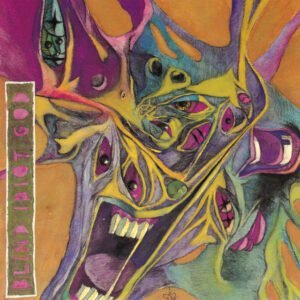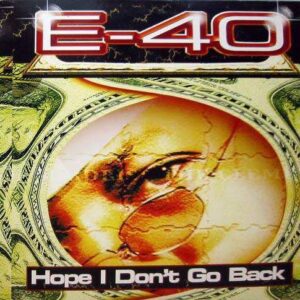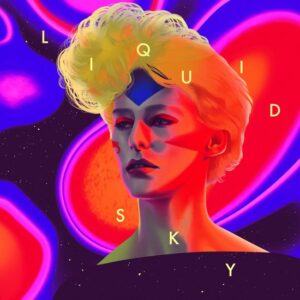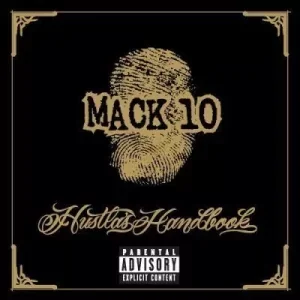Laibach “Sympathy For The Devil”
Description
International breakthrough and acceptance in Yugoslavia (1986–1991)
In London, the group recorded three songs for John Peel session and performed in the Michael Clark dance company’s play No Fire Escape from Hell. With Clark’s company they performed in Los Angeles. In the United States they were invited to a reception hosted by the British ambassador. They appeared on the reception wearing their uniforms, and the actor Walter Gotell (known for his role of General Gogol in James Bond film series), who was also present on the reception, saw this as a provocation.
Having signed for Mute Records, Laibach started recording their third studio album, Opus Dei, working with composer Slavko Avsenik Jr. The inner sleeve of the cover featured a swastika consisting of four bloodied axes designed by John Heartfield, an anti-Nazi artist. The record was sold secretly in some European countries, as the meaning of the cover was not recognised. The group achieved a commercial success with the cover versions of “Live Is Life” by Opus and “One Vision” by Queen. The usage of Nazi symbols and the name “Opus Dei” caused the Catholic institution of the same name to sue the group but the case was eventually decided in favour of Laibach. Following the album release, the group embarked on a European tour, during which they stated at a press conference in France that their influences are Tito, Toto, and Tati.
In Yugoslavia, the members of the band were invited to a meeting with Jože Osterman, Secretary of the League of Socialist Working People of Ljubljana, who tried to persuade them to change their name to Ljubljana, as, despite the lifting of the ban on the name Laibach, the group’s name still caused controversies in their home country. Despite them, the band held a sold-out concert in Ljubljana entitled Svoji ka svojim (To Their Own). Zagreb magazine Start pronounced members of the group fourth on the list of Best Dressed Men in Yugoslavia.

After the performance in Ljubljana, the band went on the European tour, during which they appeared at the end of every concert with horned helmets. On their performance at the Vienna Festival they provoked the audience with the intro stating: “Austrians, You Are Germans“, which almost forced organizers to interrupt the concert. Their performance in Amsterdam was a part of European Capital of Culture program. During the band’s performance on a five-meter–high stage, the performance crew roasted an ox on a stake on the hall’s balcony. In Hamburg, the group performed and wrote the music for an adaptation of William Shakespeare‘s Macbeth at the Deutsches Schauspielhaus, which was eventually released on the album Macbeth. In 1988, the group released the album Let It Be, featuring cover versions of all the songs from the Beatles album of the same name, with the exception of the title track, which they did not record owing to lack of studio time, and “Maggie Mae“, which was replaced by the German folk songs “Auf der Lüneburger Heide” and “Was Gleicht Wohl Auf Erden“. Their version of “Across the Universe” featured Anja Rupel of the synth-pop band Videosex on vocals. A part of the recorded material from the album would be broadcast by Paul McCartney before his concerts.
In 1989, the band went on a North American tour. On their concert in Toronto, they were joined on stage by Austrian artist and art theoretician Peter Weibel, who appeared on stage half naked with a horned helmet on his head. After their return from North America, they went on a Yugoslav tour, starting with a sold-out concert in Ljubljana’s Tivoli Hall. Their performance in Zagreb started with the Serbian instrument gusle and in Belgrade, the NSK philosopher Peter Mlakar held a speech which was a cynical parody of Slobodan Milošević‘s speeches in SAP Kosovo.
The following year, the group released the EP Sympathy for the Devil, an album of different cover versions of the Rolling Stones song of the same name. During the same year, the group emmbarked on a tour across industrial regions of Slovenia. Their concert in Šentjurje was visited by only five people due to poor promotion, but the band nevertheless performed the whole set. The band celebrated their tenth anniversary with a concert held in their hometown, at Trbovlje’s thermoelectric power station, on 21 December; 16 years later Chris Bohn of The Wire magazine proclaimed this show as one of the 60 most powerful concerts of all times. On -15°C, the visitors of the concerts were welcomed by a brass band and majorettes. After this concert, the group undertook a tour of Bosnia and Herzegovina.
Slovenian independence and beyond (1992–present)
In 1992, the group released Kapital, an album dealing with their own vision of materialism. The following year, Mute Records released the Ljubljana–Zagreb–Beograd live album, recorded at performances in the three cities in 1982, presenting a document of politically active rock from the group’s early career, especially in the songs “Tito-Tito”, “Država” (“The State”), and “Rdeči molk” (“Red Silence”). In 1994, they released the album NATO, which commented on the current political events in Eastern Europe, former Yugoslavia and the actions of the NATO pact, filtered through their vision of techno and pop. The album featured cover versions of Europe‘s “The Final Countdown“, Bolland & Bolland‘s “In the Army Now“, Don Fardon‘s “Indian Reservation” (renamed to “National Reservation”), and the Stanislav Binički composition “Marš na Drinu” (“March on the Drina“).
Following the album release, the group went on the Occupied Europe NATO Tour 1994-95, resulting in the live and video album of the same name, which featured a selection of recordings from the two-year tour, including the performance in Sarajevo on the date of the signing of the Dayton Agreement. In 1995, the group for a while considered splitting into several simultaneous lineups so that they could perform in different places at the same time, but the idea was abandoned. The following year, the group released Jesus Christ Superstars, a reference to the Andrew Lloyd Webber‘s rock opera Jesus Christ Superstar. The group promoted the album in the United States with an eighteen-date tour, as well as on a German tour.
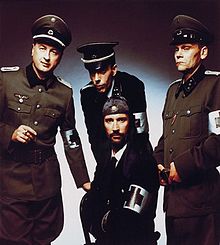
On 15 May 1997, the group performed with the Slovenian Symphony Orchestra, conducted by Marko Letonja, and the Tone Tomšič Choir, for the opening ceremony of the Ljubljana European Month of Culture, presenting orchestral versions of their earliest material, which they rarely performed live, arranged by Uroš Rojko and Aldo Kumar with the members of the group. During the same year, the live album M.B. 21 December 1984 was released, featuring recordings of the forbidden concert in the Ljubljana Malči Belič Hall, a February 1985 concert at the Berlin Atonal festival, and the April 1985 performance at the Zagreb club Kulušić. The performances had featured a guest appearance by Jože Pegam on clarinet and trumpet, and recordings of Tito’s speeches. On 14 November 1997, at a concert in Belgrade, another Peter Mlakar speech received a decidedly mixed audience reaction (in sharp contrast to the 1989 speech), in which he asked the audience to “eat the pig and digest it once and for all”, referring to the then president Slobodan Milošević.
In 2003, the group released the album WAT (an acronym for We Are Time), which, as well as new material, featured the song “Tanz mit Laibach” (German for “Dance with Laibach”), inspired by the German band D.A.F. The song lyrics were co-written with Peter Mlakar, and the music was co-written with the producer Iztok Turk (former member of Videosex) and the DJs Umek, Bizzy and Dojaja. The following year, the group released a double compilation album Anthems, featuring a career spanning selection of material as well as the previously unreleased song “Mama Leone”, which was a Drafi Deutscher cover, and remixes by Random Logic, Umek, Octex, Iztok Turk and others. The compilation also features a thorough group biography written by Alexei Monroe. The group also released two DVD‘s: the first, Laibach, featured music videos, including a new music video for the song “Das Spiel ist Aus”, and A Film about WAT directed by Sašo Podgoršek. The second DVD was entitled 2, with a recording from the Occupied Europe NATO Tour concert in Ljubljana on 26 October 1995 and the documentary film A Film from Slovenia, directed by Daniel Landin and Peter Vezjak.
In 2004, the group recorded The Divided States of America – Laibach 2004 Tour during their fourth USA tour, directed by Sašo Podgoršek and released on DVD in 2006. During 2006, the group released the album Volk (Slovenian for Wolf, German for People), featuring cover versions of national anthems, including the NSK state anthem “Das Lied der Deutschen”, originally written in 1797 and used during the Weimar Republic. Each cover featured a guest vocalist singing the anthem in their own language. During the same year, on 1 June, the group performed J. S. Bach‘s “The Art of Fugue” in his hometown Leipzig, and their interpretation of the work was released on the album Laibachkunstderfuge in 2008.
In 2014, Laibach released the album Spectre, previously announced by the EP record S featuring three songs from the album and one from a 2012 live album. The songs from the new album were also downloadable for limited time for subscribers of their mailing list. In July 2014, Laibach released an EP to coincide with the 70th anniversary of the outbreak of the Warsaw Uprising. The project was commissioned by Poland’s National Cultural Centre and includes a reworking of one of the classic songs of the insurgency, “Warszawskie Dzieci” (“Children of Warsaw”).
In April 2015, Laibach launched an Indiegogo fundraising campaign to augment costs of a tour in the United States which started in May 2015.
On 11 June 2015, Laibach announced that they would be performing a show in Pyongyang, North Korea in August 2015. The band later confirmed through their website and the website of their record label, Mute Records, that they would perform two concerts on 19 and 20 August 2015 at Kim Won Gyun Musical Conservatory in Nampo-dong, Pyongyang, to coincide with the 70th anniversary of the end of Japanese colonial rule in Korea. The announcement and the concert saw large attention of the Western media, which described Laibach’s upcoming performance as the first performance of a Western rock band in North Korea, although this was later revealed to be a misinformation. The concerts were the subject of the documentary film Liberation Day by Morten Traavik and Uģis Olte, which premiered in 2016.
In July 2017, Laibach released the album Also Sprach Zarathustra. The songs on the album were originally composed for a theatrical production of Thus Spoke Zarathustra, based on Friedrich Nietzsche‘s novel of the same name. On 12 June 2018, Laibach marked the historic summit in Singapore between President of the United States Donald Trump and the leader of North Korea, Kim Jong-un, by sharing a track Arirang dedicated to the Korean reunification process.
Laibach was scheduled to perform in Kyiv on March 31, 2023. However, the band’s description of the Russo-Ukrainian War as a proxy war angered many Ukrainians and the concert was canceled.





